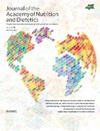美国成年人自我报告的周末时间饮食模式与平日不同:全国健康与营养状况调查:2015-20-流行病学》(National Health and Nutrition Examination Surveys: 2015-20-prepandemic.
IF 4
2区 医学
Q2 NUTRITION & DIETETICS
Journal of the Academy of Nutrition and Dietetics
Pub Date : 2025-02-01
DOI:10.1016/j.jand.2024.07.158
引用次数: 0
摘要
背景:周末与平日在进食时间上的差异可能与不良代谢和健康结果有关。然而,人们对美国成年人周末和周日进食行为时间差异的性质知之甚少:本研究旨在考察美国成年人自我报告的进食事件在时间和能量特征上的周末-周日差异:设计:观察性;人内比较:数据来自美国国家健康与营养调查(NHANES)2015年至2020年3月(大流行前),年龄大于20岁的成年人提供了一个工作日(周一至周四)和一个周末(周五、周六、周日)的24小时饮食回忆(男性3564人,女性3823人):预设的主要时间性结果是回忆摄食事件的时间以及摄食和空腹窗口期的持续时间。次要结果包括摄食事件的频率和能量特征:针对不同性别的调查加权多元线性回归模型考虑了复杂的调查设计,包括周末/平日的虚拟协变量、回忆管理模式(第 1 天为面谈,第 2 天为电话)以及受访者特定的固定截距:结果:在男性和女性中,周末首次摄入事件、早餐和午餐的回忆时间均晚于工作日(p结论:周末摄入模式的特点是摄入时间晚于工作日:周末摄入模式的特点是首次摄入事件、早餐和午餐的时间较晚,并且选择能量密度较高的食物和饮料。本文章由计算机程序翻译,如有差异,请以英文原文为准。
Self-Reported Weekend Temporal Eating Patterns of American Adults Differ From Weekday: National Health and Nutrition Examination Surveys: 2015–2020 Prepandemic
Background
Weekend–weekday differences in time of ingestive events may be implicated in adverse metabolic and health outcomes. However, little is known about the nature of weekend–weekday differences in temporal eating behaviors of the US adult population.
Objective
The study aimed to examine weekend–weekday differences in temporal and energy characteristics of ingestive events self-reported by American adults.
Design
Observational; within-person comparative.
Participants/Setting
The data were from the National Health and Nutrition Examination Surveys (NHANES) 2015–March 2020 (pre-pandemic) for ≥20-year-old adults who provided 1 weekday (M–Th) and 1 weekend (F, S, Su) 24-h dietary recall (n = 3564 men and 3823 women).
Main Outcome Measures
Prespecified primary temporal outcomes were recalled: time of ingestive events, and the duration of ingestive and fasting windows. Secondary outcomes included frequency and energy characteristics of ingestive events.
Statistical Analysis Performed
Gender-specific, survey-weighted, multiple linear regression models that accounted for complex survey design with dummy covariates for weekend/weekday, mode of recall administration (in-person on day 1 and telephone on day 2), and a respondent-specific fixed intercept.
Results
In both men and women, the weekend recalled time of first ingestive event, breakfast, and lunch were later than weekday (P ≤ .0008); however, no statistically significant differences were observed in time of dinner and the last eating episode. The mean weekend ingestive window (interval between the time of first and last eating events of the day) was shorter by 24 minutes (95% confidence interval [CI], –32, –11) in men and 18 minutes (95% CI, –20, –15) in women, and the mean overnight fasting window was correspondingly longer (P ≤ .0001). No statistically significant differences were observed between weekend and weekday frequency of ingestive events. Energy density of weekend food selections reported by women, and of beverages by men, was found to be higher than weekday (P ≤ .002).
Conclusions
Weekend ingestive patterns were characterized by later time of first ingestive event, breakfast, and lunch, and selection of higher-energy-density foods and beverages.
求助全文
通过发布文献求助,成功后即可免费获取论文全文。
去求助
来源期刊

Journal of the Academy of Nutrition and Dietetics
NUTRITION & DIETETICS-
CiteScore
7.20
自引率
10.40%
发文量
649
审稿时长
68 days
期刊介绍:
The Journal of the Academy of Nutrition and Dietetics is the premier source for the practice and science of food, nutrition, and dietetics. The monthly, peer-reviewed journal presents original articles prepared by scholars and practitioners and is the most widely read professional publication in the field. The Journal focuses on advancing professional knowledge across the range of research and practice issues such as: nutritional science, medical nutrition therapy, public health nutrition, food science and biotechnology, foodservice systems, leadership and management, and dietetics education.
 求助内容:
求助内容: 应助结果提醒方式:
应助结果提醒方式:


